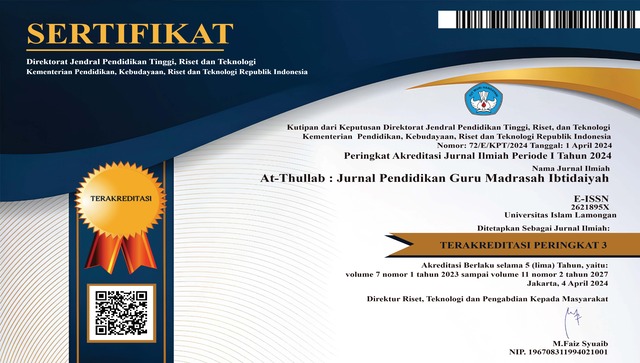PENGARUH PROGRAM SEHARI BERBAHASA JAWA TERHADAP KETERAMPILAN BERBICARA BAHASA JAWA KRAMA SISWA MI AL JABBAR SUMBERAGUNG DANDER BOJONEGORO
DOI:
https://doi.org/10.30736/atl.v3i1.201Keywords:
a day program in Javanese language, speaking skill in KramaAbstract
Javanese language is the language most widely used by Indonesian people after Indonesian, because the Javanese population is very large, spread throughout Indonesia. But along with the development of the Java language, especially Javanese language krama almost extinct caused by the younger generation lacking appreciation of the Javanese language as their regional language. In this study, researchers will analyze a Javanese language learning program that is a day of Javanese language conducted by MI Al Jabbar with a focus on implementation, manners of language skills, and the effect of the program on students' karmic speaking skills. The results of this study indicate that the Javanese language program runs very well with an average score of 81.4 students. While the effect of a day program in Javanese language with students' language skills occupying the value of the linear regression equation was obtained Y = 25.4 + 1.331X with the regression significance test showing F *> F and by testing the correlation coefficient of r = 0.438 obtained t = 2.497 which stated the influence positive between the two variables. And with a significance level of 0.05 obtained t (0.05) (33) <t arithmetic. It can be concluded that there is an influence of a sebaja program (a day in Javanese language) on the skills of speaking Javanese Krama in Al-Jabbar MI Sumberagung Dander BojonegoroDownloads
References
Indonesia, R. Undang-Undang No. 20 Tahun 2003 tentang Sistem Pendidikan Nasional. Warga Negara. Masyarakat. Pemerintah. Pemerintah Daerah. Lembaran Negara Republik Indonesia, Pub. L. No. 4301 (2003).
Muliawan, J. U. (2014). Metodelogi Penelitian Pendidikan dengan Studi Kasus. Yogyakarta: Gava Media.
Mulyana. (2008). Pembelajaran Bahasa dan Sastra Daerah Dalam Kerangka Budaya. Yogjakarta: Tiara Wacana.
Setyawan, I. (2019). â€Sikap Generasi “Z†terhadap bahasa Jawa: Studi kasus pada anak-anak usia Sekolah Dasar di kota Semarangâ€. Semarang: Universitas Diponegoro.
Sudjana. (2006). Teknik Analisis Regresi dan Korelasi Bagi Peneliti. Bandung: Tarsito.
Sugiyono. (2015). Metode Penelitian Pendidikan (Pendekatan Kuantitatif, Kualitatif, dan R&D),. Bandung: Alfabeta.
Suharsimi Arikunto. (2006). Prosedur Penelitian : Suatu Pendekatan Praktik. Jakarta: Rineka Cipta.
Sumanto. (2005). Metodologi Penelitian Sosial dan Pendidikan. Yogyakarta: Andi Offset.
Downloads
Published
How to Cite
Issue
Section
License
Authors who publish with this journal agree to the following terms:
The journal allow the authors to hold the copyright without restrictions and allow the authors to retain publishing rights without restrictions. Authors retain copyright and grant the journal right of first publication with the work simultaneously licensed under a Creative Commons Attribution-ShareAlike 4.0 International License. that allows others to share the work with an acknowledgement of the work's authorship and initial publication in this journal.
Authors are able to enter into separate, additional contractual arrangements for the non-exclusive distribution of the journal's published version of the work (e.g., post it to an institutional repository or publish it in a book), with an acknowledgement of its initial publication in this journal.
Authors are permitted and encouraged to post their work online (e.g., in institutional repositories or on their website) prior to and during the submission process, as it can lead to productive exchanges, as well as earlier and greater citation of published work (See The Effect of Open Access).
The journal allows third parties (readers, researchers, and others) to share and adapt the material in line with the license. In addition, the material must be given appropriate credit, provided with a link to the license, and indicate if changes were made. If authors remix, transform, or build upon the material, they must distribute their contributions under the same license as the original.













